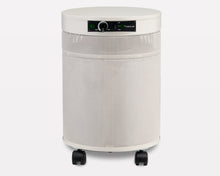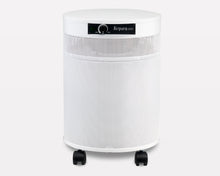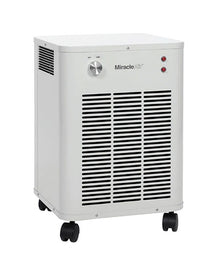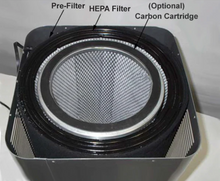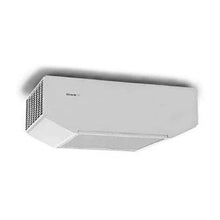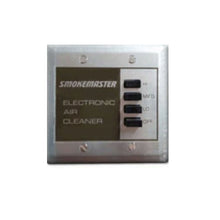Choosing Your Cigar Smoke Solution: A Comparative Guide to Air Purifier Technologies
The rich aroma and social ritual of enjoying a fine cigar are cherished by many. However, the lingering smoke and its associated odors can be a significant concern, especially indoors. Whether you have a dedicated cigar lounge, enjoy an occasional smoke in your home, or manage a commercial establishment catering to cigar enthusiasts, finding an effective solution to clear the air is paramount.

The rich aroma and social ritual of enjoying a fine cigar are cherished by many. However, the lingering smoke and its associated odors can be a significant concern, especially indoors. Whether you have a dedicated cigar lounge, enjoy an occasional smoke in your home, or manage a commercial establishment catering to cigar enthusiasts, finding an effective solution to clear the air is paramount. At Commercial Air Purifiers, LLC, we understand the importance of a clean and healthy environment. That's why we've compiled this comprehensive guide to help you navigate the world of air purifier technologies and choose the best approach to manage cigar smoke.
The challenge of cigar smoke lies in its complex composition. It's not just about the visible particles; it includes a wide array of gaseous pollutants, volatile organic compounds (VOCs), and persistent odors that can permeate fabrics, walls, and linger long after the smoke has cleared. For individuals with respiratory sensitivities, or for businesses concerned about the comfort and health of their patrons, addressing cigar smoke effectively is crucial. Simply opening a window often isn't enough, especially in varying weather conditions or in enclosed spaces. This is where air purification technologies come into play, offering a more robust and consistent solution. Understanding the different technologies available is the first step towards making an informed decision that meets your specific needs and budget.
In the realm of air purification for cigar smoke, three primary technologies are frequently discussed: HEPA filtration, activated carbon filtration, and ozone generation. Each operates on a distinct principle and offers different strengths and weaknesses when it comes to tackling the various components of cigar smoke. This guide will delve into the science behind each of these technologies, compare their effectiveness against cigar smoke, and provide practical considerations to help you choose the optimal solution for your space. Our aim at Commercial Air Purifiers, LLC, is to provide you with the knowledge and insights needed to create a cleaner, more enjoyable environment for everyone.
Understanding HEPA Filtration for Cigar Smoke
High-Efficiency Particulate Air (HEPA) filters are a cornerstone of modern air purification. These filters are designed to capture airborne particles with an impressive level of efficiency. To be classified as HEPA, a filter must be capable of removing at least 99.97% of particles 0.3 microns in diameter. This size is considered the most penetrating particle size (MPPS), meaning it's the most difficult to capture. Particles larger or smaller than 0.3 microns are typically trapped with even greater efficiency by a high-quality HEPA filter due to interception and impaction mechanisms.
When it comes to cigar smoke, HEPA filters excel at removing the visible particulate matter – the tiny solid particles that contribute to the hazy appearance of smoke. These particles can carry various byproducts of combustion and can be inhaled deep into the lungs, posing potential health risks over time. According to a report by the World Health Organization (WHO) on indoor air pollution, particulate matter is a significant contributor to respiratory and cardiovascular issues. By capturing these particles, HEPA filters play a vital role in improving the air quality and reducing the immediate respiratory irritants associated with cigar smoke.
However, it's important to understand the limitations of HEPA filtration when dealing with cigar smoke. While HEPA filters are highly effective at removing particulate matter, they do not directly address gaseous pollutants, VOCs, or odors. Cigar smoke contains numerous gaseous compounds that contribute significantly to its characteristic smell and can also have negative health effects. For a comprehensive solution, HEPA filtration often needs to be paired with other air purification technologies that target these gaseous components. Based on our experience at Commercial Air Purifiers, LLC, we've observed that relying solely on HEPA filtration for heavy cigar smoke environments may leave lingering odors and VOCs unaddressed.
The Role of Activated Carbon Filtration in Cigar Smoke Removal
Activated carbon filters offer a complementary approach to HEPA filtration by focusing on the gaseous pollutants and odors present in cigar smoke. Activated carbon is a form of carbon that has been processed to have small, low-volume pores that increase the surface area available for adsorption. This vast surface area allows activated carbon to effectively trap and neutralize a wide range of gases, VOCs, and odor molecules as air passes through the filter.
Cigar smoke contains numerous gaseous compounds, including carbon monoxide, nitrogen oxides, and various VOCs produced during the combustion of tobacco. These gases not only contribute to the unpleasant smell of cigar smoke but can also have adverse health effects. Activated carbon filters work through a process called adsorption, where gas and odor molecules adhere to the surface of the carbon material. The effectiveness of an activated carbon filter depends on several factors, including the quality and amount of activated carbon used, the airflow rate through the filter, and the specific types and concentrations of gases present.
For effective cigar smoke removal, a substantial amount of high-quality activated carbon is crucial. Some air purifiers may contain only a thin layer or a small amount of carbon, which may not be sufficient to handle the complex and concentrated gases found in cigar smoke. At Commercial Air Purifiers, LLC, our experience suggests that air purifiers designed for smoke removal often feature deep beds of activated carbon or multiple carbon filters to maximize adsorption capacity and prolong filter life. Pairing a high-quality activated carbon filter with a HEPA filter creates a synergistic effect, addressing both the particulate and gaseous components of cigar smoke for more comprehensive air purification. Research published in the Journal of Environmental Science and Technology highlights the effectiveness of activated carbon in removing various indoor air pollutants, including VOCs commonly found in smoke.
Ozone Generation for Cigar Lounges: Benefits and Risks
Ozone generators operate on a different principle than filtration-based air purifiers. These devices intentionally produce ozone (O₃), a highly reactive gas composed of three oxygen atoms. Ozone is a powerful oxidizing agent that can react with and break down various pollutants, including odor molecules and some airborne contaminants. Proponents of ozone generators for cigar lounges often cite their ability to eliminate strong odors at their source through chemical reactions.
When ozone comes into contact with organic compounds, such as those found in cigar smoke, it can break them down into less harmful substances. This can lead to a perceived reduction in smoke odor. Additionally, ozone can have disinfecting properties, potentially reducing the levels of bacteria, viruses, and mold spores in the air. Some studies have explored the use of ozone in industrial settings for odor control and disinfection.
However, the use of ozone generators for air purification, particularly in occupied spaces, is a subject of considerable debate and carries significant risks. Ozone is a lung irritant and can have adverse health effects, especially at higher concentrations. According to the U.S. Environmental Protection Agency (EPA), exposure to ozone can cause chest pain, coughing, shortness of breath, and throat irritation. It can also worsen respiratory conditions such as asthma. The EPA advises against using ozone generators as a routine method of air cleaning in occupied spaces due to these health risks and the potential for generating harmful byproducts through reactions with other indoor air pollutants.
Furthermore, while ozone can react with odor molecules, it may not effectively remove all components of cigar smoke, particularly particulate matter. The effectiveness of ozone in eliminating odors also depends on the concentration of ozone, the duration of exposure, and the specific odor compounds present. At Commercial Air Purifiers, LLC, we prioritize the health and safety of our customers and generally do not recommend ozone generators as a primary solution for cigar smoke removal in occupied spaces. Filtration-based systems offer a safer and often more effective approach to long-term air quality management.
Comparing Air Purification Technologies for Cigar Smoke
When choosing the best air purification technology for cigar smoke, it's essential to weigh the pros and cons of each option based on your specific needs and environment.
HEPA Filtration:
Pros: Highly effective at removing particulate matter, a major component of cigar smoke. Safe for use in occupied spaces.
Cons: Does not remove gases, VOCs, or odors effectively on its own. Filters require periodic replacement.
Activated Carbon Filtration:
Pros: Excellent at adsorbing and neutralizing gaseous pollutants, VOCs, and odors from cigar smoke. Can be used safely in occupied spaces when combined with other filtration.
Cons: Filter capacity can be exhausted over time, requiring regular replacement. Effectiveness depends on the quality and amount of carbon used.
Ozone Generation:
Pros: Can react with and break down odor molecules. May offer some disinfection properties.
Cons: Can be harmful to health, especially at higher concentrations. May not effectively remove particulate matter. Potential to generate harmful byproducts. Not recommended for routine use in occupied spaces by health and environmental agencies.
Based on this comparison, a combination of HEPA and activated carbon filtration is generally considered the most effective and safest approach for comprehensive cigar smoke removal in occupied environments. HEPA filters tackle the particulate matter, while activated carbon filters address the gaseous pollutants and odors. This synergistic approach ensures that both the visible and invisible components of cigar smoke are effectively managed.
Practical Considerations for Choosing a Cigar Smoke Air Purifier
Beyond the core air purification technologies, several practical factors should influence your choice of an air purifier for cigar smoke:
Room Size and Airflow (CADR): The Clean Air Delivery Rate (CADR) of an air purifier indicates how quickly it can clean a room of a specific size. For effective cigar smoke removal, especially in larger spaces or areas with frequent smoking, choose an air purifier with a CADR rating appropriate for the room volume. Commercial Air Purifiers, LLC, offers models with varying CADR ratings to suit different space requirements.
Filter Quality and Capacity: For activated carbon filters, pay attention to the amount and quality of the carbon. A deeper bed or a higher quantity of activated carbon will generally provide better and longer-lasting odor and gas removal. Similarly, ensure that the HEPA filter meets true HEPA standards (99.97% efficiency at 0.3 microns).
Pre-Filters: Many air purifiers include pre-filters to capture larger particles like dust and pet dander. These pre-filters help to extend the life of the more expensive HEPA and carbon filters, which is particularly beneficial in smoke-filled environments.
Noise Level: Air purifiers operate with a fan to circulate air through the filters. Consider the noise level of the unit, especially if it will be used in a quiet environment like a home office or a lounge where conversation is desired.
Maintenance and Filter Replacement: All filtration-based air purifiers require periodic filter replacement. Consider the cost and availability of replacement filters when making your decision. The lifespan of filters will depend on the frequency and intensity of cigar smoking.
Additional Features: Some air purifiers may offer additional features such as air quality sensors, automatic mode adjustment, or smart controls. While these features can be convenient, prioritize the core filtration capabilities for effective cigar smoke removal.
Our Recommendations at Commercial Air Purifiers, LLC
Based on our expertise in air purification, Commercial Air Purifiers, LLC, strongly recommends air purifiers that combine high-quality HEPA and activated carbon filtration for effective cigar smoke removal in occupied spaces. This dual-filtration approach addresses both the particulate and gaseous components of cigar smoke safely and efficiently.
For individuals seeking to manage occasional cigar smoke in a home environment, a well-designed air purifier with a true HEPA filter and a substantial activated carbon filter can be highly effective. Ensure that the CADR rating is appropriate for the size of the room where smoking occurs. Regular filter replacement will be crucial to maintain optimal performance.
For commercial cigar lounges or establishments with designated smoking areas, investing in high-capacity air purifiers with robust HEPA and activated carbon filtration systems is essential. These units are designed to handle higher levels of smoke and odors and often feature more durable construction and larger filter capacities. Implementing multiple units strategically placed throughout the space can further enhance air quality.
We advise against the routine use of ozone generators in occupied spaces due to the potential health risks associated with ozone exposure. While ozone may offer some temporary odor reduction, filtration-based systems provide a safer and more sustainable solution for long-term air quality management.
Conclusion: Breathe Easier with the Right Air Purification Solution
Choosing the right air purification solution for cigar smoke is an investment in the health, comfort, and overall enjoyment of your space. By understanding the principles behind HEPA filtration, activated carbon filtration, and ozone generation, you can make an informed decision that aligns with your specific needs and priorities.
At Commercial Air Purifiers, LLC, we are committed to providing effective and reliable air purification solutions. We believe that a combination of HEPA and activated carbon filtration offers the most balanced and safest approach to tackling the complex challenge of cigar smoke. By prioritizing air purifiers with high-quality filters, appropriate CADR ratings, and a focus on both particulate and gaseous pollutants, you can create a cleaner, healthier, and more welcoming environment for yourself and others. Explore our range of air purifiers designed to meet diverse needs and experience the difference that clean air can make.
Sources:
World Health Organization. (2014). WHO guidelines for indoor air quality: selected pollutants. World Health Organization.
U.S. Environmental Protection Agency. (n.d.). Ozone Generators That Are Sold as Air Cleaners. Retrieved from [Insert Link to a relevant EPA page about ozone generators here]

